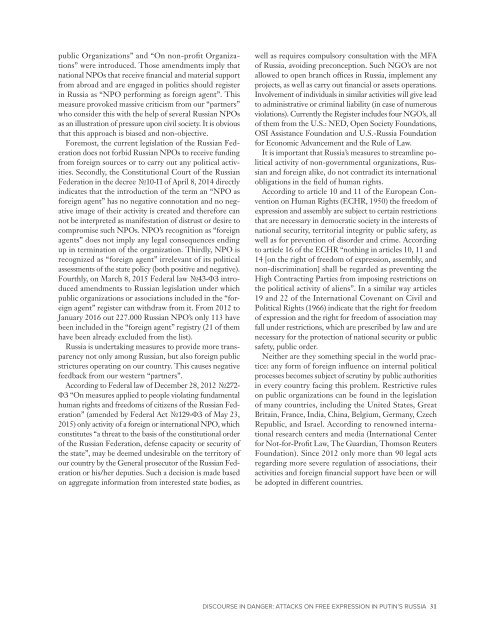DISCOURSE IN DANGER
2poGcgOv3
2poGcgOv3
You also want an ePaper? Increase the reach of your titles
YUMPU automatically turns print PDFs into web optimized ePapers that Google loves.
public Organizations” and “On non-profit Organizations”<br />
were introduced. Those amendments imply that<br />
national NPOs that receive financial and material support<br />
from abroad and are engaged in politics should register<br />
in Russia as “NPO performing as foreign agent”. This<br />
measure provoked massive criticism from our “partners”<br />
who consider this with the help of several Russian NPOs<br />
as an illustration of pressure upon civil society. It is obvious<br />
that this approach is biased and non-objective.<br />
Foremost, the current legislation of the Russian Federation<br />
does not forbid Russian NPOs to receive funding<br />
from foreign sources or to carry out any political activities.<br />
Secondly, the Constitutional Court of the Russian<br />
Federation in the decree №10-П of April 8, 2014 directly<br />
indicates that the introduction of the term an “NPO as<br />
foreign agent” has no negative connotation and no negative<br />
image of their activity is created and therefore can<br />
not be interpreted as manifestation of distrust or desire to<br />
compromise such NPOs. NPO’s recognition as “foreign<br />
agents” does not imply any legal consequences ending<br />
up in termination of the organization. Thirdly, NPO is<br />
recognized as “foreign agent” irrelevant of its political<br />
assessments of the state policy (both positive and negative).<br />
Fourthly, on March 8, 2015 Federal law №43-ФЗ introduced<br />
amendments to Russian legislation under which<br />
public organizations or associations included in the “foreign<br />
agent” register can withdraw from it. From 2012 to<br />
January 2016 out 227.000 Russian NPO’s only 113 have<br />
been included in the “foreign agent” registry (21 of them<br />
have been already excluded from the list).<br />
Russia is undertaking measures to provide more transparency<br />
not only among Russian, but also foreign public<br />
strictures operating on our country. This causes negative<br />
feedback from our western “partners”.<br />
According to Federal law of December 28, 2012 №272-<br />
ФЗ “On measures applied to people violating fundamental<br />
human rights and freedoms of citizens of the Russian Federation”<br />
(amended by Federal Act №129-ФЗ of May 23,<br />
2015) only activity of a foreign or international NPO, which<br />
constitutes “a threat to the basis of the constitutional order<br />
of the Russian Federation, defense capacity or security of<br />
the state”, may be deemed undesirable on the territory of<br />
our country by the General prosecutor of the Russian Federation<br />
or his/her deputies. Such a decision is made based<br />
on aggregate information from interested state bodies, as<br />
well as requires compulsory consultation with the MFA<br />
of Russia, avoiding preconception. Such NGO’s are not<br />
allowed to open branch offices in Russia, implement any<br />
projects, as well as carry out financial or assets operations.<br />
Involvement of individuals in similar activities will give lead<br />
to administrative or criminal liability (in case of numerous<br />
violations). Currently the Register includes four NGO’s, all<br />
of them from the U.S.: NED, Open Society Foundations,<br />
OSI Assistance Foundation and U.S.-Russia Foundation<br />
for Economic Advancement and the Rule of Law.<br />
It is important that Russia’s measures to streamline political<br />
activity of non-governmental organizations, Russian<br />
and foreign alike, do not contradict its international<br />
obligations in the field of human rights.<br />
According to article 10 and 11 of the European Convention<br />
on Human Rights (ECHR, 1950) the freedom of<br />
expression and assembly are subject to certain restrictions<br />
that are necessary in democratic society in the interests of<br />
national security, territorial integrity or public safety, as<br />
well as for prevention of disorder and crime. According<br />
to article 16 of the ECHR “nothing in articles 10, 11 and<br />
14 [on the right of freedom of expression, assembly, and<br />
non-discrimination] shall be regarded as preventing the<br />
High Contracting Parties from imposing restrictions on<br />
the political activity of aliens”. In a similar way articles<br />
19 and 22 of the International Covenant on Civil and<br />
Political Rights (1966) indicate that the right for freedom<br />
of expression and the right for freedom of association may<br />
fall under restrictions, which are prescribed by law and are<br />
necessary for the protection of national security or public<br />
safety, public order.<br />
Neither are they something special in the world practice:<br />
any form of foreign influence on internal political<br />
processes becomes subject of scrutiny by public authorities<br />
in every country facing this problem. Restrictive rules<br />
on public organizations can be found in the legislation<br />
of many countries, including the United States, Great<br />
Britain, France, India, China, Belgium, Germany, Czech<br />
Republic, and Israel. According to renowned international<br />
research centers and media (International Center<br />
for Not-for-Profit Law, The Guardian, Thomson Reuters<br />
Foundation). Since 2012 only more than 90 legal acts<br />
regarding more severe regulation of associations, their<br />
activities and foreign financial support have been or will<br />
be adopted in different countries.<br />
<strong>DISCOURSE</strong> <strong>IN</strong> <strong>DANGER</strong>: ATTACKS ON FREE EXPRESSION <strong>IN</strong> PUT<strong>IN</strong>’S RUSSIA 31


